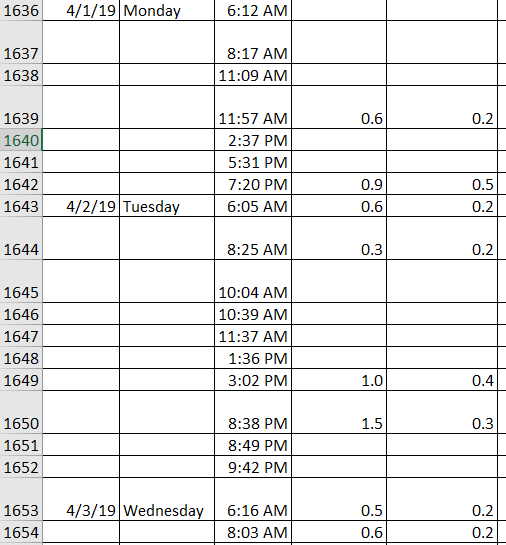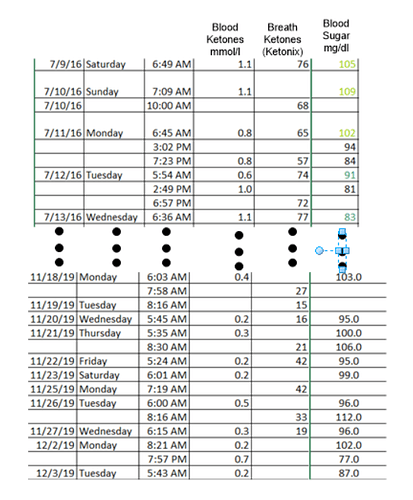Has anyone documented their measurements, along with results based on differing variables within the ketogenic lifestyle? I would be curious to see other’s data from such experimenting.
I have been measuring blood glucose and ketones after doing “Keto Carnivore” for one month. I can share the data if there is interest. With recording this data, I monitored results based off multiple variables, including:
- Time between meals
- Fat/Protein ratio
- Type of exercise for that day
- Small sample size of others such as MCT oil/Exogenouse ketone intake, heavy carb/calorie meal, extended fast, questioned food sensitivity, dawn effect, etc…
Almost a month of recording, taking 2 measurements a day, I will share what I noticed:
-
I would take my first measurement before lunch, around 12:30pm. I was ALWAYS in a deep state of ketosis (<2 GKI) before my first meal. This was typically around 17.5 hours fasted, with exception of coffee with heavy cream/cashew milk/stevia in the am, so not a big surprise there.
-
My second measurement would be taken before dinner, around 5:30pm. Roughly 4 hours since lunch. I would typically range from 6-9 GKI, with exception of a few times being deeper than that, and several times being over 9.
-
My protein had been consistently higher than my fat. Something in the range of 1.55-1.75 protein over fat. I tried several lunches with a little more fat than protein (just slightly higher than 1:1). Both approaches seem to produce very similar readings. I have not done what some do as far as 80% fat, or 2:1 fat to protein. I typically keep protein considerably higher than fat.
-
I monitored my readings dependent on if I trained strength that day, did cardio, or rested. It seemed I would achieve a better GKI on cardio days. My theory is glycogen is getting depleted more with this activity. Either way, I would always be very deep in ketosis regardless of cardio, strength, or rest.
Small sample sizes:
-
I had an “earned” meal after 5 weeks. A ton of carbs and calories. My next measurement was taken after a 25 hour fast proceeding the “earned” meal., which showed 6.1 GKI (back in ketosis) I extended this fast ~72 hours. GKI at 47 hour mark was 1.8, at 69 hour mark it was 0.4 GKI.
-
I tested a couple times in the morning with coffee. One measurement was done with heavy cream/cashew milk. 5.2 GKI before the coffee, 4.1 GKI after. One time coffee with exogenous ketones/cashew milk. This measured 3 GKI before coffee, and 3.9 GKI after (ketones went DOWN with the exogneous ketones)
-
One experiment was with mozzarella cheese to see rise in glucose/lowering of ketones. Pre-meal GKI was 6.8. One hour later it was 13.4, and 3 hours after meal it was 6.1 Seems to be a normal response to any food, so no problem with the mozzarella cheese.
Other notes:
- My lowest ketone reading was 0.4
- Highest ketone reading (with exception of the 72 hour fast) was 3.9
- Best GKI number (with exception of the 72 hour fast) was 0.8
- Averages over the ~25 days were: Glucose - 81, Ketones 1.7, GKI 4.4.
- Worst GKI reading (outside of the 1 hour post meal reading) was 12.9. This reading was when I just began measuring. As time has gone by, the numbers are showing a deeper level of ketosis, and staying in ketosis shortly after meals.
But we’re chasing results, not ketones, right? With that said, I was not overweight when I began, but has excess weight I wanted to lose. By body fat recommendations, I would be in the lean category, but am aiming to get leaner. This has certainly helped with that consierably, and beyond that, my energy is fantastic. Workouts are great, and I’m thriving. As one who lvoes to analyze health related data, I thought I would share some observations of my numbers while on a ketogenic diet. If anyone has monitored tis similar the way I have, I would certainly be interested in hearing their results as well.



